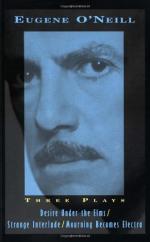|
This section contains 15,932 words (approx. 54 pages at 300 words per page) |

|
Dictionary of Literary Biography on Eugene (Gladstone) O'Neill
In the 1910s the American theatre, long dominated by melodramas, dictatorial producers (most of whom were artless magnates), and an audience more drawn by stars--preferably British--than good scripts, was finally ready to establish its own identity. The change had begun in the late nineteenth century with a generation of earnest though ultimately ineffective playwrights: James A. Herne, Bronson Howard, David Belasco, Augustus Thomas, Clyde Fitch, and William Vaughn Moody. Belasco's experiments with lighting, set construction, and special effects made the American theatre equal and, in some ways, superior to the European theatre.The American innovations of the nineteenth century and the dramas of Henrik Ibsen, August Strindberg, and George Bernard Shaw brought more of the next generation's talent to the theatre. George Jean Nathan, Barrett H. Clark, Joseph Wood Krutch, Alexander Woollcott, Kenneth Macgowan, Heywood Broun, and Burns Mantle formed a critical battery willing to demand and capable...
|
This section contains 15,932 words (approx. 54 pages at 300 words per page) |

|


